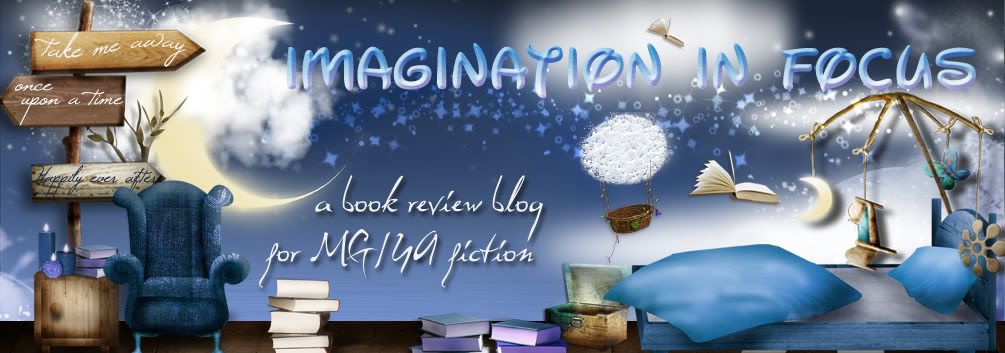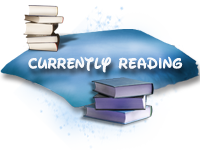



The $1,000,000 question for the day is What is the difference between MG & YA literature?
This gets a little tricky, because when I took Literature for Children last year, my textbook said that "Middle Grade or Intermediate Fiction" was a branch of Young Adult fiction, which encompasses roughly the ages of 10-21. YA nowadays, I'd say, is more synonymous with "teen fiction" and when I say YA, that's what I mean. Those are the definitions that I was taught, and they're the ones I use, just for clarification's sake.Here is were I DISAGREE with the particular post:
1) the idea that MG-Intermediate is "kids fiction." I hate that phrase like I hate soy milk. To me (as someone who reads a bunch of "MG" targeted fiction and fully plans to teach middle school) that really incenses me. Okay, so it's perfectly fine for grownups (high school grads, as I call it---if you've graduated from high school, you're a "grown up" to me) to read YA (which usually refers to "teen fiction") but Middle Grade-Intermediate stuff is "kid" fiction. Really?! So to get this straight, if you write for middle grade, you're writing for kids. First of all, middle grade fiction is indicative of the middle grades: meaning 11-14. That's right - 14 year olds. That's not very "kiddie" to me. Most 8th graders complete their school year as 14-year-olds. Most.
The ages are closer than one might originally think. But to me, it's the audacity of the statement. I don't feel like I'm reading beneath my level when I read The Chronicles of Prydain or the Redwall books or Harry Potter or Percy Jackson or The Lost Years of Merlin/Great Tree of Avalon or The Wardstone Chronicles or Inkheart. I will admit to reading certain YA books and wanting to claw my eyes out. MG books seem to chronicle true rites of passage in a way that many "teen fiction" books do not.
Really, I guess I just want to defend MG-Intermediate fiction. If it's not okay to dismiss YA books because of their target audience, it shouldn't be okay to dismiss MG.
And that's my next point. 2) I do not work for publishers, but I do believe (and other authors have said this too...or at least, they've typed it on their blogs/sites) that the labels "MG" "YA" and so forth are really more for marketing purposes. Target audiences. That does not limit an audience in any way by their age. My mid-40s pastor is totally in love with the Harry Potter books. And he's not a "kid." And he wasn't a "kid" when they came out. My 70-something grandmother loves the Twilight series. My parents love Percy Jackson (I'm serious: at dinner one night, my dad looked at us all and said, "If I was a half-blood, who do you think my godly parent would be?" And an actual discussion ensued). I think it is little more than marketing. In fact, labels such as that remind me a lot of MPAA ratings - they have no basis whatsoever on the quality of the picture: there are really stupid and worthless G-rated movies and there are amazing R-rated movies. The label doesn't say anything about quality. Now I will admit that that's a bit of a stretch, and I don't want to go down the "content" road...
3) The idea (voiced in the post that I'm ranting about) that it's okay to have "morals" in that back of your head when you write "kid fiction" but not when you write for the glorified "young adults." I just want to sidebar and say: MG-aged audiences are just as much "kids" as teen are. Don't balk just yet - why shouldn't it be true? They're all under 18, so legally they're all minors. Yeah, teenagers have things going on that are different and unique to their present experiences, but let's not create a rift here. Middle Grade fiction - as kid fiction - is all butterflies and rainbows, with moral messages and everything, but YA fiction is where serious things occur. Teenagers - because they're TEENAGERS! - do not need moral messages. That's kid stuff for kids. Maybe I'm the only one, but that's a pretty fractured message: moral messages, values, and other "teachable moments" are the stuff of kids' fiction, because kids need that, but once you graduate from Middle Grade to Young Adult (which encompasses high school, and freshmen are all of 14 years old) you no longer need moral mesages, values, or teachable moments. Because you're a TEENAGER and you automatically know everything. And if for some weird reason you don't know everything - that's okay! You'll figure it out all on your own, because you're a TEENAGER.
What am I trying to say? I'm saying that upper-Middle Grade-Intermediate readers and Teen readers are probably less than a year's difference away. I don't think rifts need to be created. I don't think a stark contrast should be seen between Middle Grade-Intermediate fiction and YA-Teen fiction. And I think that both genres/subgenres (honestly still not sure which phrase to use) need respect. Don't dismiss YA literature as immature and childish, but certainly don't dismiss Middle Grade-Intermediate. Some of the greatest authors' works reside in that section of the bookstore, and they do not write kid stuff for kids. They write literature for young people, award-winning and multi-million dollar literature that is enjoyed by adolescents, teenagers, and adults alike. Don't limit their talent by assuming to dismiss their work as "for kids." And don't assume that teenagers aren't in need of guidance as well - both the teen characters and the teen readers.
For an author to make "moral messages, values, teachable moments, etc" purely the stuff of "kid fiction" is to miss the mark entirely and assume too much of teenagers/young adults. Everybody needs values, guidance and teachable moments, and books with messages are often the ones that stand out above the superficiality of the "just for entertainment" stories. I know which type I'd rather read, and I know which type I'd rather write. Bravo, Intermediate and Middle Grade Authors. May the Young Adult authors follow from your examples, and perhaps Young Adult literature will become less superfluous and more inspiring.















12 shout-outs!:
Good post, Amelia! Honestly, there is so much crossover these days, I don't really believe there's too much of a difference anyway. Plus, we all enjoy what we will enjoy no matter what "level" it supposedly is :)
Awesome post girlie! You definitely have a point. Personally, I think that there shouldn't be an "age stigma" on ANY type of book. Obviously, three year olds probably should stay away from adult romances, but you guys get my point. It's perfectly fine for someone who's not classified as the target audience for MG or YA to read those books. They're READING. That's what's important. :)
Great post with a great question. Unfortunately, there's not a clear cut answer. As you pointed out, there are too many contradictions, exceptions, cross overs and rule breakers that it's difficult to come up with a good classification for MG and YA.
When I do go shopping in a bookstore that's broken out into sections, I often have to check in each of the locations (adult, "YA" / "Teen", "Middle Grade" and sometimes even "Kids Chapter Books") to find the "YA" book I'm looking for.
There are many cases where the publishers and booksellers don't know how to classify a book. Sometimes even the author gets stuck in the middle.
Generally speaking, I let the "tone", "nature" and "presentation" of the content dictate the age range.
As a kid, "middle grader" and "young adult", I read books from all across the spectrum. Granted, when i was growing up, there weren't as many distinctions...there was basically "adult", "early readers" (or young kids) and "children's." I think by the time I left Junior High, I saw some "teen" shelves in the libraries.
As a Junior High student, I read and was recommended a number of books that are in the "adult" shelves today. I also read and was recommended a number of books that are in the younger kids shelves today.
As an adult and a parent, I still read from all the age ranges...partially to read with my kids and partially because I just really enjoy the stories/writing. What I've found is that the categorization is still full of confusion. For the "young kids" books, it's generally safe to say that they are appropriate for young kids...but even there I've found some exceptions and some "young readers" and even kids picture books that would be PG-13 movies.
Sadly, the categorization makes a bigger difference than it should. As you mention, there's a certain stigma with an "adult" reading a "kids" book. There's also a lot of hesitance for literary critics to take kids or YA/MG books seriously.
Just as with life in general, the more labels we create, the more confused and problematic things become. It's great to be able to more quickly find titles that "might" be applicable to a particular age range or taste. But we always need to remember that the categorization is often based on poor criteria and is sometimes a stereotypical 'knee-jerk' placement rather than an accurate definition of the book.
I read what I want to read. I let my kids read the books that I personally feel are appropriate for their maturity and ability. If there's ever any confusion, we either read the book together or I read it first.
In the end, the labels don't matter nearly so much as what's inside the pages and what you can get out of them when you read it.
Wow...that ended up being a long, rambling response. Sorry. lol
Great post! I find the classification very confusing at times. As a parent, I wish it was easier to decipher what is MG and what is YA. I do agree that both offer great books.
Wonderful post! Personally, I like Middle Grade better. Epicness is definitly my cup of tea.
Great post! All these labels or sub-genres can really box in and stereotype readers. It's so frustrating.
MG vs YA is something I think about every day! I teach 6th grade and my kiddos are at so many different maturity levels, it's so hard to know what books could be a best fit for them. For me, I think I just ignore the labels and read, read, read so that I am better prepared to match books up with kids (instead of just matching up with ages). I'm just stopping by on the Blog Hop, but am so glad I found you!
Wow awesome post! I must say a lot of times I read MG novel's because I feel that YA lack's a bit in the inspiring department, and personally I like a message (no matter what it's about really as long as it's good) to be in a book.
I hate morality plays aimed at any level. I don't mind a book teaching a lesson but the lesson shouldn't be the only point. I look at the difference between chapter books, middle grade and young adult being determined by reading level and vocabulary.
I completely understand where you're coming from, but I semi-disagree. I don't think applying a MG or YA "label" is necessarily bad. I am a teen myself and call me ignorant or whatever (I try not to be, I swear!) but I like books I can connect with, and I really find it difficult to do that with a 11 year old protagonist.
Vocabulary and reading level can play a part between the to 'genres' but so does the content itself. I thought Rebecca Stead's "MG" novel, When You Reach Me, was written spectacularly, and could definitely compete with the vocabulary and writing of any YA book out there; not to mention it also won the Newberry Medal. That being said, I wouldn't call it YA because of the content, the characters, and just how they interact. I found it hard to connect with the protagonist because of her age. This is completely my opinion only :)
--I also just wanted to add that morals had nothing to do with my opinion of MG books like WYRM. Messages and Lessons aren't my concern with MG books, it is way I connect with the stories and characters, plus there are always the MG/YA crossovers that are really difficult to define.
Post a Comment